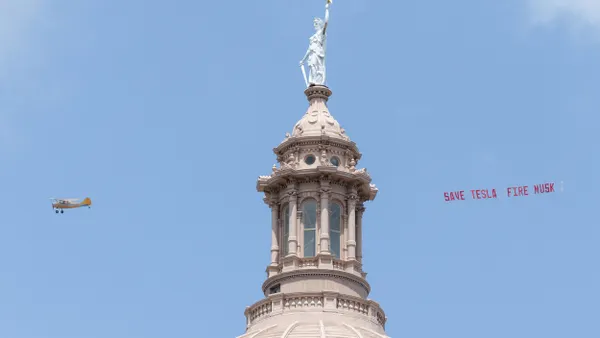Dive Brief:
- Hugh Johnston, CFO of snack food and beverage giant PepsiCo, says the company is preparing for another round of increased prices in 2022.
- Throughout the third quarter, the results of which Pepsi shared this morning, Pepsi has been gradually raising its beverage prices and is upping the cost of its snacks to offset its higher input costs, Johnston said. Sector rivals, like Coca-Cola, have been doing the same.
- “I expect [to] see more pricing increases in the first quarter of next year as we deal with the fact that input costs are just higher,” Johnston said on CNBC’s Squawk Box. “That’s just the reality for us and everybody else.”
Dive Insight:
As is customary for packaged food and beverage companies, Purchase, N.Y.-based PepsiCo buys the commodities and materials it needs months in advance, but those contracts don’t help it stave off inflation, CNBC reported.
“The forward-buying can only do so much for us,” said Johnston, adding that the tactic only buys PepsiCo “about six to nine months of room.”
In that window, PepsiCo can “ease consumers into” seeing higher prices on their goods.
Many food companies have been shelling out more for ingredients and materials amid rising costs costs for freight, fuel and labor, the Wall Street Journal has reported.
“Because of the resiliency we have previously built in the supply chain, we're doing pretty well,” Johnston said. “But particularly with packaging, which comes from a lot of areas around the world, it hasn't been easy on us. Our supply chain people have really stepped up, but we're not immune to any of that.”
Because of the advanced planning PepsiCo has initiated, and because of its forward buying of commodities and materials, the company is faring better amid the global supply chain constraints than most, Johnston said.
Nonetheless, the company had to "scramble" to overcome a shortage of cans and bottles in recent months as demand sharply increased at restaurants and theaters after stay-at-home orders lifted, Johnston told Reuters.
"I do expect there will probably be some price increases in the first quarter of next year as well, as we fully absorb and lock down the impact of commodity inflation," he said, adding he expects most supply-chain disruptions to "moderate" by the end of the year.
On PepsiCo’s Tuesday morning earnings call, company CEO Ramon Laguarta told analysts consumers' view on pricing has evolved since pre-pandemic times, which could be due to PepsiCo's success in selling value.
“As consumers shop in-store, they might pay less attention to pricing as a decision factor, and they might be giving more relevance to the brands they feel more emotionally attached to,” Laguarta said.
“We really have been investing heavily in our brands and we’ve been investing heavily in innovation,” Johnston told Yahoo Finance, echoing Laguarta's sentiment. “I think we’re providing products that consumers are willing to pay more for.”
Throughout the third quarter, PepsiCo saw an increase in its operating costs as a result of inflation in labor, commodities and transportation, the company reported, which led to a 3% net income drop, even despite an 11.6% net revenue growth. In the quarter ending Sept. 4, Pepsico's year-over-year profit fell to $2.22 billion from $2.29 billion, and its operating expenses grew to $7.64 billion from $6.92 billion.













